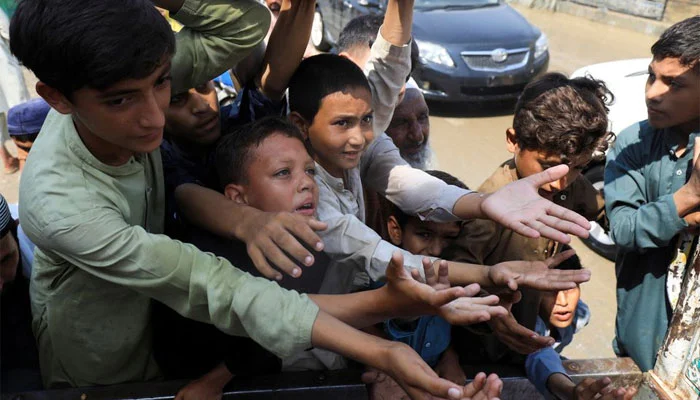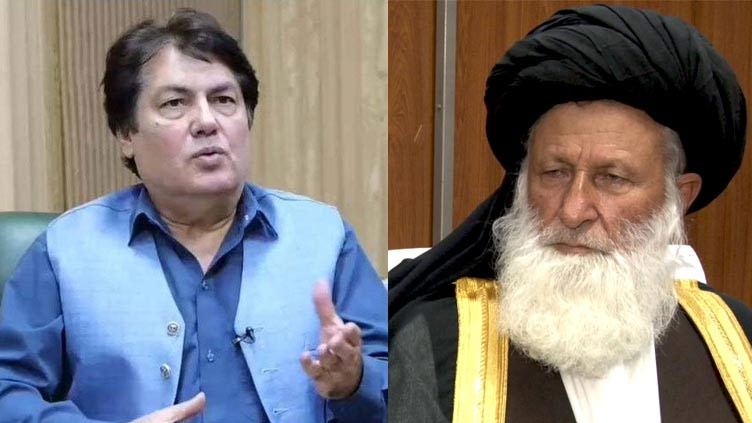- United Nations describes floods as “unprecedented climate catastrophe” while appealing for aid.
- Pakistan receives nearly 190% more rain than 30-year average so far this year.
- Guterres to head to Pakistan next week to see effects of catastrophic floods.
CHARSADDA: Torrential rains and flooding have submerged a third of Pakistan and killed more than 1,100 people, including 380 children as the United Nations appealed for aid on Tuesday for what it described as an “unprecedented climate catastrophe.”
Army helicopters plucked stranded families and dropped food packages to inaccessible areas as the historic deluge, triggered by unusually heavy monsoon rains, destroyed homes, businesses, infrastructure and crops, impacting 33 million people, 15% of the 220 million-strong South Asian nation.
The country has received nearly 190% more rain than the 30-year average in the quarter through August this year, totalling 390.7 millimetres (15.38 inches). Sindh province, with a population of 50 million, was hardest hit, getting 466% more rain than the 30-year average.
“One third of the country is literally under water,” Climate Change Minister Sherry Rehman told Reuters, describing the scale of the disaster as “a catastrophe of unknown precedent”.
She said the water was not going to recede anytime soon.
At least 380 children were among the dead, Prime Minister Shehbaz Sharif told reporters during a briefing at his office in Islamabad.
“Pakistan is awash in suffering,” UN Secretary-General Antonio Guterres said in a video message, as the United Nations launched an appeal for $160 million to help the South Asian nation. “The Pakistani people are facing a monsoon on steroids — the relentless impact of epochal levels of rain and flooding.”
Guterres will head to Pakistan next week to see the effects of the “unprecedented climate catastrophe,” a UN spokesperson said.
He said the scale of the climate disaster commanded the world’s collective attention.
Nearly 300 stranded people, including some tourists, were airlifted in northern Pakistan on Tuesday, a state-run disaster management agency said in a statement, while over 50,000 people were moved to two government shelters in the northwest.
“Life is very painful here,” 63-year-old villager Hussain Sadiq, who was at one of the shelters with his parents and five children, told Reuters, adding that his family had “lost everything.”
Hussain said medical assistance was insufficient, and diarrhoea and fever common at the shelter.
Pakistan army chief General Qamar Javed Bajwa visited the northern valley of Swat and reviewed rescue and relief operations, saying that “rehabilitation will take a long, long time.”
The United States will provide $30 million in support for Pakistan’s flood response through USAID, its embassy in Islamabad said in a statement, saying the country was “deeply saddened by the devastating loss of life, livelihoods, and homes throughout Pakistan.”
‘Obligation to help’
Early estimates put the damage from the floods at more than $10 billion, the government said, adding the world had an obligation to help Pakistan cope with the effects of man-made climate change.
The losses are likely to be much higher, said the prime minister.
Torrential rain has triggered flash floods that have crashed down from northern mountains, destroying buildings and bridges, and washing away roads and standing and stored crops.
Colossal volumes of water are pouring into the Indus river, which flows down the middle of the country from its northern peaks to southern plains, bringing flooding along its length.
Pakistani Foreign Minister Bilawal Bhutto-Zardari said hundreds of thousands of people were living outdoors without access to food, clean water, shelter or basic healthcare.
Guterres said the $160 million he hoped to raise with the appeal would provide 5.2 million people with food, water, sanitation, emergency education and health support.
‘Not enough aid’
Prime Minister Sharif said that amount of aid would need “to be multiplied rapidly,” pledging that “every penny will reach the needy, there will be no waste at all.”
Sharif feared the devastation would further derail an economy that has already been in turmoil, possibly leading to an acute food shortage and adding to skyrocketing inflation, which stood at 24.9% in July.
Wheat sowing could also be delayed, he said, and to mitigate the impact of that, Pakistan was already in talks with Russia over wheat imports.
General Akhtar Nawaz, chief of the national disaster agency, said at least 72 of Pakistan’s 160 districts had been declared calamity-hit.
More than two million acres (809,371 hectares)of agricultural land were flooded, he said.
Bhutto-Zardari said Pakistan had become ground zero for global warming.
“The situation is likely to deteriorate even further as heavy rains continue over areas already inundated by more than two months of storms and flooding,” he said.
Guterres appealed for a speedy response to Pakistan’s request to the international community for help, and called for an end to “sleepwalking towards the destruction of our planet by climate change.”
“The extreme monsoon flooding tells us that there is no time to waste, the climate tipping point is here,” said Rehman, the climate change minister, adding Pakistan is looking for the developed world to not let it pay for other countries’ carbon-backed development.


 Latest News3 days ago
Latest News3 days ago
 Latest News3 days ago
Latest News3 days ago
 Latest News3 days ago
Latest News3 days ago
 Latest News3 days ago
Latest News3 days ago
 Latest News3 days ago
Latest News3 days ago
 Latest News3 days ago
Latest News3 days ago
 Latest News3 days ago
Latest News3 days ago
 Latest News3 days ago
Latest News3 days ago













